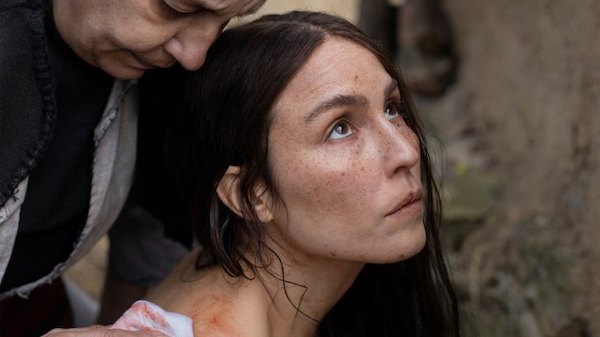Film Review: “You Won’t Be Alone” — Witchcraft, Forever
By Peg Aloi
This is no run-of-the-mill supernatural witch movie.
You Won’t Be Alone, directed by Goran Stolevski. Screening at Kendall Square Cinema and Coolidge Corner Theatre.

A scene from You Won’t Be Alone. Photo: Sundance Institute
This hauntingly beautiful film was, for me, the most memorable offering from Sundance this year. It’s difficult to pin down its genre, but it’s about a witch and set in a series of rural villages during the 19th century — so let’s call it folk horror, a descriptor for films steeped in legends and lore connected to landscape, ritual, and, often, human sacrifice.
You Won’t Be Alone begins with a folkloric figure, a witch named Old Maid Maria, played by Romanian actress Anamaria Marinca. Old Maid Maria steals other women’s children and raises them as her own to be witches; it’s revenge for cruelty she suffered as a young girl. But the mother whose child is next in line convinces Old Maid Maria to agree to wait and take the child when she is 16. Her mother decides to raise her in a cave to keep her safe, allowing her to see no one. The child has no way to learn a common language, so she makes up her own, mostly based on observations of birds she sees overhead, random animals that find their way into the cave, and sounds made by the weather. Her existence is one of both simple survival and aching loneliness. When Old Maid Maria comes to make good on her agreement, the child is turned into a witch. But this is no run-of-the-mill supernatural witch movie.
Australian-Macedonian filmmaker Goran Goran Stolevski sets an art-house tone early on by creating an unusual voice-over for this child who becomes a witch. The ongoing soft-voiced narration is minimalist and poetic; the subtitles are alluringly impressionistic. Her speech seems to suggest she is an adult who is looking back on her childhood, but we don’t know yet how many years the witch with this disembodied voice has endured. She seems to exist out of time; her strange personal wisdom is based purely on observation. It is a paradoxical view of the world: childlike yet imbued with an earthbound intuition that feels ancient. Cinematically, it’s a daring perspective that asks the viewer to suspend disbelief but to listen and observe closely, to identify with the heroine’s oddly omniscient vantage point.
The witch is the center of the action, which unfolds with scenes of ordinary feudal life in Eastern European farming villages: there are chores, livestock, arranged marriages, and family drama. The witch embraces every sensory experience but quickly punishes anyone who hurts her. Among her powers is an ability to shapeshift, entering other people’s bodies and living through their physical sensations. This plot point allows for a brilliant conceit: one character is portrayed by a succession of different actors. The witch is played variously by performers who many filmgoers will know well, including Swedish actress Noomi Rapace (Lamb, The Girl with the Dragon Tattoo) and Australian actress Alice Englert (Ratched, The Power of the Dog). The entire cast is perfect, embodying a simpler, rougher, yet often surprisingly gentle period in the history of humanity. When the witch enters a new body she is instantly constrained by whatever life that person was leading — and that includes backbreaking drudgery as well as oppression and violence. The witch survives as best she can, shapeshifting at will, but sometimes, fascinatingly, she endures unpleasantness and brutality before she makes the leap. Pain, too, is among the array of experiences and sensations that she gathers like wildflowers in a basket.
What’s most intriguing to me about this film is how it completely reframes witchcraft as a concept and a cinematic trope. There is no supernatural exercise of magic or uncanny power: the witch’s abilities are inexplicable yet somehow very human. Her visceral connection to nature is palpable; her commentary articulates that link with a dreamy weight. Her wisdom is subtle and not easily accessed. Her words beg to be listened to, but the witch doesn’t seem to know or care that we’re there. Is this witch mortal or otherworldly? Is this a fairy tale or an existential allegory? Conventional categories regarding art and stories don’t seem to apply here. You Won’t Be Alone meditates on the nature of existence and what it means to be alive. By exploring the world through the eyes and body of a witch whose life feels both earthbound and ethereal, this stunning, intimate film finds beauty and horror in equal measure.
Peg Aloi is a former film critic for the Boston Phoenix and member of the Boston Society of Film Critics. She taught film studies in Boston for over a decade. She writes on film, TV, and culture for web publications like Vice, Polygon, Bustle, Mic, Orlando Weekly, Crooked Marquee, and Bloody Disgusting. Her blog “The Witching Hour” can be found at themediawitch.com.
